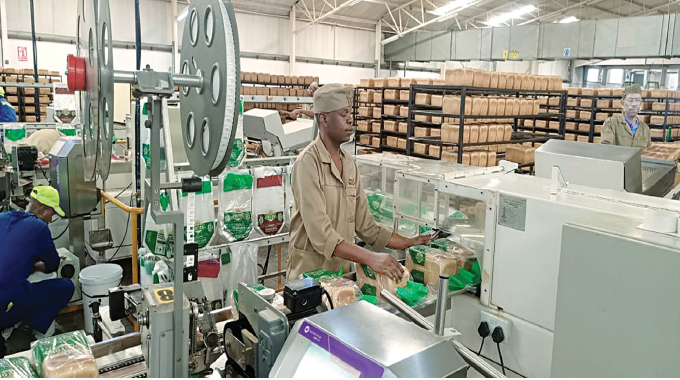Tech start-ups need viable solutions for sustainable wealth creation

Tatenda Mapfumo, Business Correspondent
IN an era where most Zimbabwean companies are downsizing or closing shop completely, start-ups offer the possibility of employment and wealth creation. The term start-up, usually associated with technology-based companies, typically refers to a new and innovative business venture that offers a high potential for growth.
Several tech start-ups have launched in Zimbabwe in the past few years, but most are struggling to survive and are in need of solutions to make them viable. Among the tech-start-ups launched in Bulawayo is NeoLab Technology, which implements business models to enable students at tertiary institutions to participate in the development and deployment of ICT products.
Chronicle Business correspondent Tatenda Mapfumo (TM) spoke to Neolab Technology founder and co-CEO Takunda Chingonzo (TC) about the challenges faced by tech start-ups, and potential solutions that could help with their growth and sustainability.
Takunda, a graduate of the National University of Science and Technology, has been a participant in US President Barack Obama’s Young African Leaders Initiative, and featured in Forbes Magazine’s 2015 Forbes 30 Under 30: Tomorrow’s Billionaires.
He was a finalist in the 2013 Junior Chamber International Zimbabwe Young Creative Entrepreneurs Award, and winner in 2013 of the Boost fellowship’s SME Awards for the most outstanding start-up venture.
Find excerpts of the interview below:
TM: How relevant are tech start-ups in Bulawayo and how big is the Bulawayo market opportunity for tech start-ups?
TC: By definition a start-up is an entity that is created to create value. It’s about what one person can do to create value in solving a particular problem. Start-ups by nature are meant to challenge the status quo, to make things better. Because start-ups are systematic change drivers, their relevance is intrinsic.
The problems being solved by start-ups are subjective. We have start-ups that are trying to bring about financial inclusion, start-ups in connectivity space, start-ups in the logistics space, start-ups in the convenience or on demand sector. It’s basically about finding financial gain, or economic value or growth by solving societal problems.
When it comes to market size, we encourage start-ups to use our local marketing quotes as more or less a testing ground. Bulawayo alone is not large enough to sustain your business for a given number of years.
We treat these markets as a place where you can prove that you have a product that people would like to buy and then try as much as you can to scale that product to the rest of the country and sub-Saharan Africa.
It’s not only about how big the market is, but whether your product gets taken up by that market and then how to scale it to the regional one. If you try and build simply for the Bulawayo market, your sustainability and scalability will be put to question.
TM: How can tech start-ups contribute to the growth of the Zimbabwean economy amidst the high unemployment rate, liquidation of companies and low money supply growth?
TC: We’re existing in a time where the job markets are tight, companies are downsizing, so to want to believe that the existing companies are going to get to a point in the next six months or a year where they start to recruit people is a bit of a stretch.
The probability that start-ups that are started today will go out and start to recruit about 10 people in six months as compared to the probability that existing companies will recruit the same number in the same period is quite higher.
Start- ups are more agile, they are looking to find out whether there is more value as quickly as possible. Tech in itself won’t solve the problems we have; it will not cure AIDS, bring food for the hungry or end crime. It’s some sort of tool we can use to lower the costs of trying to provide a solution and to increase the impact of the particular solution. When it comes to doing business, technology is a cost mitigating strategy.
Existing businesses might have the resources to scale up something, but they do not have the agility and they cannot move as fast as start-ups can in trying to figure out which technology works and which one doesn’t.
There are different types of startups, there are business centric start-ups that are profit driven, your social entrepreneurship or start-ups that are trying to solve social problems in communities in a sustainable way, and they can actually make money based on that.
TM: What kind of services is Neolab providing for tech start-ups?
TC: We work with entrepreneurs and university students to essentially build start-ups. We have built internally some of the resources that start-ups need to build their products.
For instance, online resources like web hosting and building websites, we already house these things internally and provide them for our start-ups. When it comes to tech start-ups, you need technically skilled and qualified people, but most of these people that are qualified enough to build these products are already working for someone else or either require you to pay a lot of money to get that done.
So we have what we call a “Devshop”, where we do developer syndication to help create developers that have the skills set that start-up founders require to build the products. We create a lot of internal infrastructure that we offer our start- up founders for free to help them build their solutions.
They also benefit from our networks that we have built with advisors and mentors to help them scale up their products. All this is done to reduce the costs associated with trying to start-up.
There is also the training element. We help the start-ups figure out whether they are going to be a success or not very quickly, so that they don’t waste time and money. We do help tech start-ups and their entrepreneurs through training on business concepts that they need to understand when starting-up.
We are using new age tools and training to help entrepreneurs to sail fast and sail forward, helping them to understand that the concepts that they start with initially are not what will be able to scale up on the market and, if they do so quickly enough, they have the resources to build something that the market would actually want.
TM: How has Neolab solved previous problems or challenges being faced by the start-ups they are currently working with?
TC: The real value of what we provide as Neolab is through the experience that we as Neolab experienced when we were trying to start-up. We have also worked on our own start-ups, trying to figure out how to build this and that. A good number of start-ups came to us with ideas or with concepts without the technical skills to help them build actual products, without the financial skills to understand how to monetise their ideas.
That’s the kind of help we have given to start-ups that we have and are currently working with. You have start-ups that were unable to afford the infrastructure to build their products and start-ups that had legal issues like contracts, Intellectual Property (IP), patenting, protection of software, and these were problems that were preventing the products from going into the market.
Most of the founders that come to us with concepts or ideas find that there are two or so other people that share the same idea and have the same goal. Therefore, you are able to connect like-minded individuals and they become more sustainable start-ups. Those are some of the things that start-ups have benefited from being in our ecosystem.
TM: What are the barriers to entry in the field of tech start-ups or IT?
TC: The Zimbabwean market, especially in enterprise markets, has a lot of monopolies that are at play. You have a situation whereby there are one or two entities that have dominated the market and these entities, because they control so much, they don’t work with start-ups as you would expect them to.
I also think this whole notion of entrepreneurship and start-ups has become a buzz word and everyone wants to become involved. People do not understand the challenges that are involved. It’s not like today we have an idea, tomorrow we have a product and in three months we are millionaires, it’s never like that.
When people try to start businesses, they promise a lot of value, then realise this stuff is difficult and then they just quit and disappear.
That has made it tougher for genuine entrepreneurs who are trying to build genuine products. For instance, if I were an established company and a start-up founder came to me and I started working with them, then two months later they disappeared. I would begin to view start-ups as these highly volatile and very risky entities I can’t work with. Therefore, it makes it difficult for investors to help startups.
TM: How can these challenges be solved or curbed?
TC: In dealing with established entities what we really need in Zimbabwe is a success story, and that’s why we started community hacks such as Neolab to show people that yes it really works. It all looks well and fine on paper but very few people are willing to take that next step and that’s why we’re working with existing companies to show that it is possible to work together in a mutually beneficial way and we do need those success stories as a catalysing effect.
When it comes to regulations I think we are also getting to a point where the responsible authorities are beginning to listen to what start-ups are saying.
TM: What regulation is in place that’s positively or negatively affecting start-ups?
TC: The time that is taken to register a company in Zimbabwe versus the agility of startups is one of the things that make starting up very difficult. It takes about four weeks to register a business, which is challenging for start-ups as they need two, three weeks to move from idea stage to some sort of product.
There is also the Private Business Corporation Act (PBC), which has limitations on issues to do with investing. Only individuals can invest in a PBC, whereas with start-ups, funds are raised from family and institutional entities. This framework, although it was made for people who cannot afford the amount needed to start a Private Limited company, when it comes to raising funds, it becomes a hindrance.
There are also issues to do with intellectual property. The existing framework, which is shrouded in many technical issues, makes it difficult for individuals to register a patent for example. The public has to know issues like IP registration, utility designs, trademarking, copyright and protection of software.
TM: Most start-ups that are failing or those that have shut down were mainly facing financial constraints, mainly due to the fact that banks are reluctant to give out loans. What are the other viable channels of acquiring funding or attracting investors?
TC: It is not always about focusing on the conventional raising of funds like seed rounds, looking for loans and micro-financing institutions. There are people who have started experimenting on crowd funding (method of raising capital through the collective effort of friends, family, customers, and individual investors) and have also setup crowd funding platforms, although it might not be as popular in Zimbabwe as in other countries. There is also a notion of pre-selling, that is, to ask certain clients to pay for the products first, then the products will be delivered after payment.
Pre-selling is a way of financing products that are not as risky as the whole startup. There are individuals who are interested in assisting start-ups fully knowing the risks. The catch is that these people will be interested in start-ups that actually have a product that creates value.
Money will follow good ideas that are well executed, not just ideas, not just having an amazing business plan, pitch backs and suit and tie, but products that are actually showing some sort of growth.
We have venture capitalists and people who are also willing to fund things that are working and all you need to do is to make those people know and see what you are doing. We have hub entities and hubs such as Neolab, Motor Republic in Harare, Skyhub, Area 46 and
Stimulus, all of which help with exposure. These hubs have networks and connections to people that fund startups, so it is advisable to join a hub or an entrepreneurial network.
TM: What are start-up weekends and how can they be beneficial to Bulawayo tech entrepreneurs?
TC: These are 54-hour events where entrepreneurs work together to come up with ideas that attendees agree on in terms of whether they think they are viable or not. They turn these ideas into minimum viable products that will be tested on the last day of the weekend.
There are sponsors that come in to incentivise those who would have built the best product. Start-up weekends would be beneficial to the Bulawayo community in that they offer an opportunity to meet other entrepreneurs and see what they are working on or building.
They help create an ecosystem or a value chain among entrepreneurs, whereby founder A has developed a solution that founder B can make use of and they both benefit from that networking. They also offer an opportunity to get ideas off the ground. The objective is not to go there to win, but it’s about accelerating the growth of your idea into a product.
Even if you do not win, you learn from that experience and from other entrepreneurs on how to pitch your ideas better or how to develop your products.
TM: What advice would you give for start-ups interested in participating in these weekends?
TC: Participation is mainly about trying to turn your idea into an actual product. Think about what your end game is, such that your building a product is not pinned on you winning at the weekend or not. Begin to look at what happens at a start-up weekend and what kinds of ideas are pitched.
Focus on what you as an individual want to walk away with, not everybody wins but when you go to an event and say “I want to learn how to pitch, I want to learn how to work in a team”, even if you do not win, you will leave the event knowing you have achieved those things. If you have an idea you want to channel into a product, start working on it way before the start-up weekend.











Comments